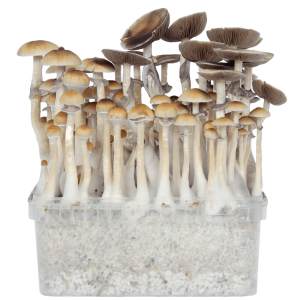These include (among others) the finding that psilocybin can ease depressive symptoms for up to a year, and that it could soon be poised to topple the supremacy of the pharmaceutical industry.

The Largest Study of Its Kind So Far
Excitingly, more evidence has arrived, in the form of a newly released study. It is the largest study of its kind conducted so far, making it more verifiable, reliable, and normalized to a wider public who are not acquainted with psychedelics.
The trial was led by the mental healthcare firm Compass Pathways. It was conducted over 22 sites across 10 countries in North America and Europe over 12 weeks.
The study focussed on sufferers of treatment-resistant depression. Today, an estimated 251-310 million people across the world suffer from depression. Of those 30% are thought to suffer from treatment-resistant depression. This is defined as failing to respond positively to two or more antidepressant treatments. This means that between 75 and 93 million people globally are suffering from this debilitating condition. They have no option to alleviate it by the methods currently available. Those who suffer from this form of depression tend to have more severe and longer lasting symptoms. They also have a higher risk of suicide, hospitalisation and physical illness.

Preparing for the Study
233 people with treatment-resistant depression were enrolled in the study titled ‘Single-Dose Psilocybin for a Treatment-Resistant Episode of Major Depression’. In the lead up to the study the participants were asked to reduce their usage of antidepressants. Two weeks before the psilocybin session they were expected to have stopped altogether. They were then asked not to take them for 3 weeks after receiving the psilocybin.

However, antidepressant treatment “…could be started at any time during the trial if deemed clinically necessary by a physician investigator” according to the authors. The researchers also assessed the individual severity of the depression of each participant’s depression before the trial. This assessment was repeated several times during the 12 week follow-up period after the study. Additionally, the participants met with therapists 3 times before the session, and two times after.
The Study Itself
The first thing to note about the study itself is its use of Compass Pathway’s synthetic psilocybin called COMP360. Secondly, it was randomized and double-blind — i.e. making it a water-tight-as-they-come operation. Thirdly, there were 3 different dosages of synthetic psilocybin provided. One of 1 milligram, one of 10 milligrams and one of 25 milligrams. These were assigned randomly.
The psilocybin sessions were supervised by two therapists, and lasted between 6 and 8 hours.
The results, described as ‘exceptional’ by Compass Pathway’s chief medical officer Prof Guy Goodwin, showed an almost instantaneous decrease in depression symptoms after a single dose of psilocybin, and the therapeutic sessions. The strongest benefit was observed among those who had been given 25 milligrams (the highest dose) of synthetic psilocybin.
Dr. James Rucker, a consultant psychiatrist at King’s College London and one of the researchers for the trial said;
“This study, which is by far the largest clinical trial on the use of psilocybin for treatment-resistant depression to date, demonstrated that a single 25-mg dose of psilocybin improved participants’ symptoms of depression in comparison to a 1-mg dose.”
He added;
“These findings are a positive step in the right direction. Our task now is to investigate psilocybin for treatment-resistant depression in larger clinical trials with more participants, comparing it both to placebo and to established treatments.”
More is More with Psilocybin Dosage
The 25 milligram group yielded the star results. 37% of those who received this dosage showed improvement, and 29% of them in fact being in remission after 3 weeks. Oncologist, palliative-care specialist and professor of medicine at UW Medicine in Seattle, Dr. Anthony Back, said that for the 25 milligram group; “there was a pretty substantial benefit and it happened very quickly.”
However, only 19% and 18% of participants in the 10 milligram and 1 milligram groups respectively showed improvement after the 3 week mark.

But, by week 12, the 25 milligram groups’ responses had decreased to 20%, and the differences between groups were no longer statistically significant.
The depression symptoms of the participants were measured using the Montgomery-Asberg Depression Rating Scale. This is a ten item questionnaire, in use by psychologists since 1979.
A Project Still in Process
The results look both exciting and promising, however, Dr. Back reminds us the project is still in progress;
“…it’s not the perfect treatment. There are people who didn’t respond, and there are people for whom the depression came back.”
Further research is needed to address the current limitations, and to see how progress can be made, such as looking at whether multiple doses are necessary for longer lasting results. Additionally, Back proposes that the next trial should compare psilocybin-assisted therapy to more traditional treatments, like antidepressants. They should also have longer follow-ups, such as 6 months or more.
These points aside however, this new trial is another shining light for those suffering from previously untreatable mental conditions, and another nail of legitimacy hammered in for the psychedelic cause.
As always, we shall bring you more information as it comes!






